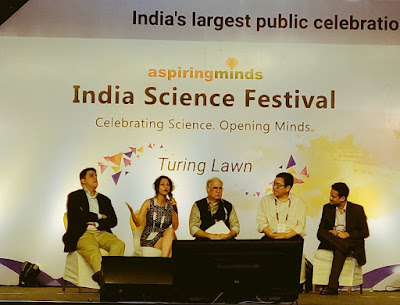Speaking on panels at the Amsterdam Privacy Conference
Amsterdam Privacy conference kicks off this weekend. Am doing a number of presentations at this conference which makes this quite a hectic few days to come. To start with, I am presenting with my co-author René König on "Imagining the “diversity algorithm: Alternatives in ideological governance and their challenges." Basically, we bring together two discourses and fields of study that have rarely intersected – sociology of diversity and computing studies to arrive at new understandings of the challenges that we face in the embedding of ‘diversity’ as a value in the design of net-based technologies. Our paper maps tensions among different diversity-driven cultures alongside the challenges that come with operationalizing them through technological design. This demands a re-examining of what constitutes as exclusion and inclusion, what is boundary-making for fair representation, is visibility empowering, and other such critical questions. The fact is that diversity is a rising concern, with the demand for re-examining boundaries of representation, perspectives and voices that shape society. Silicon Valley, for instance, is under fire for their homogenous programming teams inscribing their biases into the algorithms that influence our behaviour (Crawford 2016). Universities, boardrooms, and political parties are working at restructuring their organizational cultures and systems given their abysmal record on diversity (Ferreira 2015; Abbott, Green, and Keohane 2016). While this is a growing momentum, it is worth asking how this diversity movement will influence our digital infrastructures. Will the diversity-driven models lead to strengthening democracy? How do we situate meritocracy within these proposed digital configurations? As we play these specific imaginaries out, we present possible outcomes, begging the question of the kind of digital future that awaits with each of these ideological turns.
I also organized a panel on Data and the Global South alongside Linnet Taylor and her data justice team. Today, we see how a select number of Western-based technology companies like Google, Amazon, Facebook and Apple have achieved the monopolization of entire publics. Under the banner of ‘connecting the unconnected’, corporate social media platforms such as Facebook and WhatsApp justify their growing expansion in the Global South. While harvesting our attention for profit is the global template, technology companies’ control over Global South nations has a far more powerful impact as they rule these lands with few laws and regulations impeding them. At times, they collude with the state by adhering to and even strengthening their surveillance practices, possibly fostering an even more fragile civic liberty. This process is complicated with the rise of privacy and data protection laws in many countries in the Global South. This panel brings together scholars working on the rising datafication within diverse regions such as Asia, Africa and Latin America. We will jointly investigate how contemporary global configurations of digital technology impact social inequalities and possibly create new forms of discrimination as well as opportunities for data justice. We will touch upon privacy rights in the Global South, surveillance of data subjects, global digital economies of exploitation, extraction and extension, decolonial computing and colonization of internets, algorithms and discrimination and data justice and resistance.
Lastly, will be on a group privacy panel to explore how to take this discourse forward. My paper argues that popular contemporary approaches to the digital privacy culture of the global poor is at risk of falling along a long reproduced socio-political continuum. Specifically, three dominant templates make the round concerning privacy values of the global poor: privacy is a luxury for this disadvantaged group, they dont care about their privacy and that privacy to them is utility driven.
I also organized a panel on Data and the Global South alongside Linnet Taylor and her data justice team. Today, we see how a select number of Western-based technology companies like Google, Amazon, Facebook and Apple have achieved the monopolization of entire publics. Under the banner of ‘connecting the unconnected’, corporate social media platforms such as Facebook and WhatsApp justify their growing expansion in the Global South. While harvesting our attention for profit is the global template, technology companies’ control over Global South nations has a far more powerful impact as they rule these lands with few laws and regulations impeding them. At times, they collude with the state by adhering to and even strengthening their surveillance practices, possibly fostering an even more fragile civic liberty. This process is complicated with the rise of privacy and data protection laws in many countries in the Global South. This panel brings together scholars working on the rising datafication within diverse regions such as Asia, Africa and Latin America. We will jointly investigate how contemporary global configurations of digital technology impact social inequalities and possibly create new forms of discrimination as well as opportunities for data justice. We will touch upon privacy rights in the Global South, surveillance of data subjects, global digital economies of exploitation, extraction and extension, decolonial computing and colonization of internets, algorithms and discrimination and data justice and resistance.
Lastly, will be on a group privacy panel to explore how to take this discourse forward. My paper argues that popular contemporary approaches to the digital privacy culture of the global poor is at risk of falling along a long reproduced socio-political continuum. Specifically, three dominant templates make the round concerning privacy values of the global poor: privacy is a luxury for this disadvantaged group, they dont care about their privacy and that privacy to them is utility driven.



Comments
Post a Comment